Today, on opening day, we are talking with Rogue One Director Gareth Edwards.
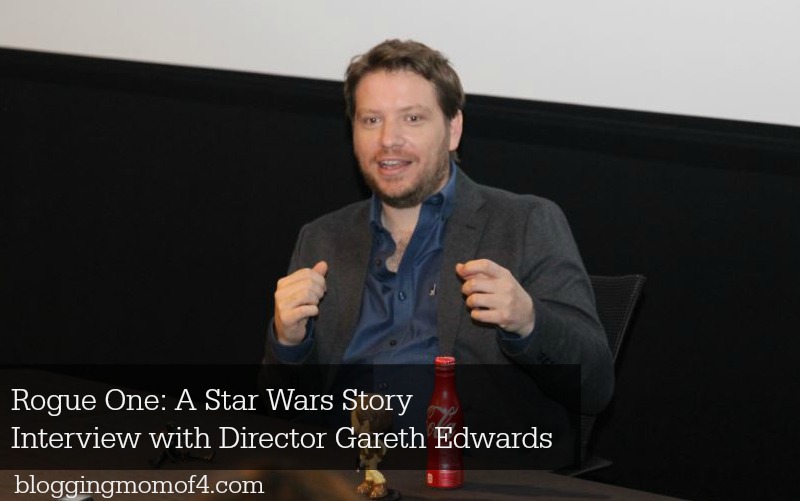
Photo Credit: Louise Bishop/momstart.com
The wait is finally over!
Rogue One: A Star Wars Story opens in theaters TODAY!
Do you have tickets? I’m so excited to see the film in it’s entirety! Hopefully you all have enjoyed all of the Rogue One coverage leading up to opening day.
Last, but certainly not least, is our interview with Rogue One Director Gareth Edwards. I always love talking to the director of any film. I love seeing Gareth’s passion and what went into making this incredible movie!
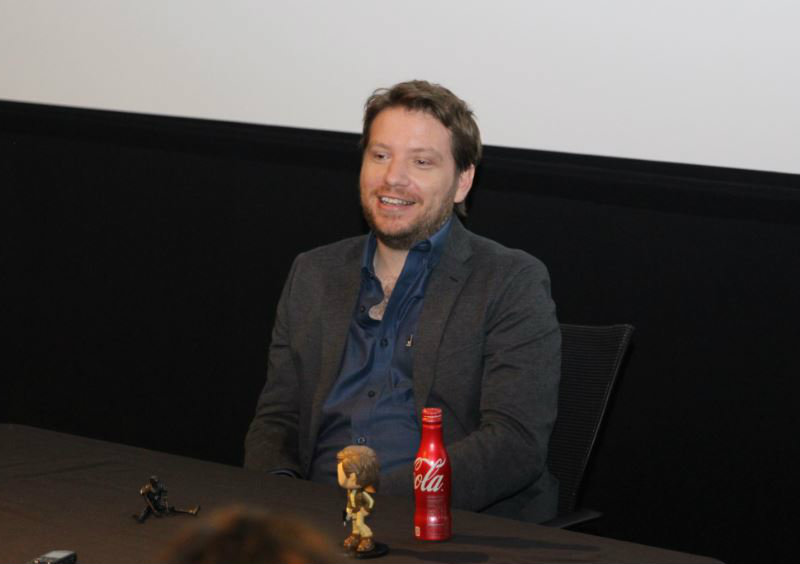
Photo Credit: Louise Bishop/momstart.com
Rogue One: A Star Wars Story Director Gareth Edwards
Rogue One Director Gareth Edwards started off the interview talking about what he would have done to prepare for directing Star Wars. I love how he said that he’s glad, way back when, that he didn’t know he’d be involved in this movie because he would have been a nervous wreck. So he’s glad he didn’t know.
Because I think there’s something about the organic process of making a film, and working with others that if you don’t let it in…
If you are a dictatorship, like The Empire, and you say it’s gonna be this, this, and this. I don’t care what I see, I don’t care what the actors do. This is what it’s going to be, I think you limit how great the film can become. So it was trying to become much more of an organic process where even when we were filming, the director of photography, the guy in charge of the camera, we had an agreement that we were gonna keep it incredibly fluid. We had 360-degree sets where we could film in any direction.
How difficult, or intimidating, was it to tackle a property like Star Wars knowing the rabid fan base will scrutinize every word and action, and then how did you overcome that…
There’s a line in the original where Luke Skywalker, and I grew up watching it every day. It’s definitely the reason I got into filmmaking. And Luke is doing the attack run on the Death Star through the trench. He’s got the computer, and he turns it off, and it goes wee, weeeek. And someone goes, Luke! You’ve turned off your computer! And he goes, it’s okay, I’m all right.
It’s kinda like that. He trusts the force. And, and so literally you turn off your computer and not look at the internet. And just believe you can bulls-eye this. You’ve just got to keep going! Everyone’s shooting at you.
But just believe in yourself and then go for it. To me, that’s the takeaway from the original film was if you believe you can do something, and you never give up, then you can achieve anything. I guess I took it too literally. I want to make Star Wars films. But it applies to everybody. Like, people who do way more important things than me.
How did you go about choosing your cast? Did you have specific people in mind?
What happens is you try not to think of anyone to start with, because you try and think about these characters. Then it gets really difficult to keep talking about someone, and not being able to visually picture them. Inevitably, you end up going like so and so from that movie. Or this person, and you start to take on specific people in the world, and I know definitely for things like Saw Gerrera and Krennic.
Ben [Mendelsohn] and Forrest [Whitaker] just popped up straight away. I’ve seen Ben’s work and as we were trying to figure out this character that was starting to happen called Krennic that he plays, I loved Animal Kingdom. I thought it was one of the best films in a long time. And then forgot about it. And then watched a film called Startup and I just came away that night going we’ve got to call this guy. This guy is Krennic. We’ve got to try and get him. And as I came into work, […] I’m gonna pitch this to the producer. I’m gonna try and sort them into it. And as I walked into the office Simon, one of the producers, said can I just stop you a second?
No. I want to talk to you about Krennic. He goes, I’ve got the guy. He’d watched a totally different film, and he said, Ben Mendelson. I was about to say Ben Mendelson… It was really weird. Like, genuinely weird. And then from that point on, we were not gonna take no for an answer. And thank God Ben’s a massive Star Wars fan.
I met him on a rooftop in LA, which sounds really glamorous, but it was raining. We’d already organized to meet there, so we did. We wanted to be away so no one could hear, so you could talk. I would get really paranoid about waiters and things, because once you say the word Darth Vader or something they’re gonna pay attention. Trying to talk to him, please let us have you for this film. And as soon as I talked about Star Wars, he was just giggling and going, like, hehe hehe. I was, like, you’re a fan? He says ‘I love it! I watched it all the time as a kid.’ I says, why I got into films.
I was thinking we might be all right. The same with Forrest. He is not his character, but he has done amazing work outside of acting. He’s a phenomenal human being. And I think just before we met, he’d just done a talk at the United Nations. And you’re feeling, oh my God. I don’t really deserve to be talking to this guy about a role in a film because he’s the real deal.
He’s incredibly humble and peaceful. But you see him in his roles, and he can be intimidating and aggressive. But he’s more like Yoda when you chat with him. And in a way, Saw represents the mentor in our movie. So he’s like the Obi-Wan sort of Yoda-type figure. So it made a lot of sense.
Tell us how you got your foot in the door to become a Star Wars director.
I went to film school. I wanted to make films. That’s all I ever wanted to do as a kid. And graduated and I’d read the Steven Spielberg story of how you make a short film, and then Hollywood calls and then you go off directing movies. And I think they lost my number? Because I never got that call, and I had to go back. I worked in a supermarket. And tried to earn some money to buy a computer so I could learn software. Because it felt like this was gonna be the future of filmmaking.
That digital technology. It was all kind of developed here with George [Lucas] and ILM, and pushing the boundaries. I thought you could make a film from home on a home computer. I just needed six months and I could learn the software to go make one. It took me more like ten years to learn it and be any good. I spent that time doing visual effects for things like the BBC and discovery channel.
Then one day I just thought, I’ve had enough. I can’t live with myself. Being an old man, having never tried to do what I really wanted to do, which was to become a director. So I quit my job. This company, in England, they gave us some money, and we went and made a film where there was just five of us traveling around Central America.
And I did all the visual effects myself, and shot it. Thought the best thing that could happen, we were in that car, as we were driving doing this road movie thing. Okay what needs to take place after this for it to be worthwhile? Because it was about two years of your life. And I said, if I get to direct a TV show, that would be it.
Then, we showed it at South by Southwest. The projection broke down. It was, like… Oh, man! Then at the end of the thing, this guy cames up to me and he gives me a business card. He says I’d love to talk to you whenever you’ve got a moment. I was, like, okay. And we left. And then the next day, as if by magic, he turned up.
He just found me somehow. He sat down. He said can I just talk to you for a second when you’ve got a moment? I was, like, sure. And he said I’m from an agency in Hollywood, and I represent directors, and I’d like to represent you. And I said oh, okay. And then he said, do you want to know who else I represent? You had me at agent…
He says I’m with clients Quinton Tarantino and Tim Burton. So I was, like, really? And you want me?
From that day on, my life changed. You don’t need to know anything about Hollywood. You just need to make a film, and then these people exist. So they go, okay, we’re gonna make it happen.
I don’t know how it really works. I think if I had my life again, it wouldn’t happen the same way.
Did Gareth get to use any props from the first trilogy?
What’s so funny is obviously they never anticipated that Star Wars would become this when they made it.
So there’s sometimes not a record of what an object is. Can’t talk about some things ’cause they’re spoilers, but there was definitely… I remember, on Yavin, which is the Rebel planet, there’s a guy as the Millennium Falcon comes in, he sort of follows it with this speed gun or something. Assume it’s a speed gun. He’s not gonna shoot at the Millennium Falcon.
They were calling up, trying to find it. They called the art department and they said ‘we haven’t got a record of it or what it is that he’s holding.’ What did they do? They called the guy that’s originally in the bucket and asked if he remembered what it was!”
He said, oh yeah! We got them. We didn’t have anything. So we grabbed a light meter for the camera. And something else and we taped it together, and I just held it. And we asked what were those objects? We just want to get those objects and do exactly the same thing. He’s like, I’m not sure! So we looked at it in high res, and tried to replicate it. And with the blue milk stuff, I’ve got a confession, which is… I’m a massive Star Wars fan obviously. And for my 30th birthday, I went to Tunisia and woke up on the day I turned 30 in Luke Skywalker’s house.
Not by accident. It wasn’t like a crazy night out. I took some blue dye with me because I wanted to drink blue milk on the very table where he does with Aunt Beru and Uncle Owen. I actually made a blue milk glass drink and drank it. And then dropped it, and it went all over the floor and there’s this big blue stain now…
I felt really bad because this is cinema history. And then I was, well, you kinda left your mark, you know. That might outlive me in Star Wars world than anything else that I know.
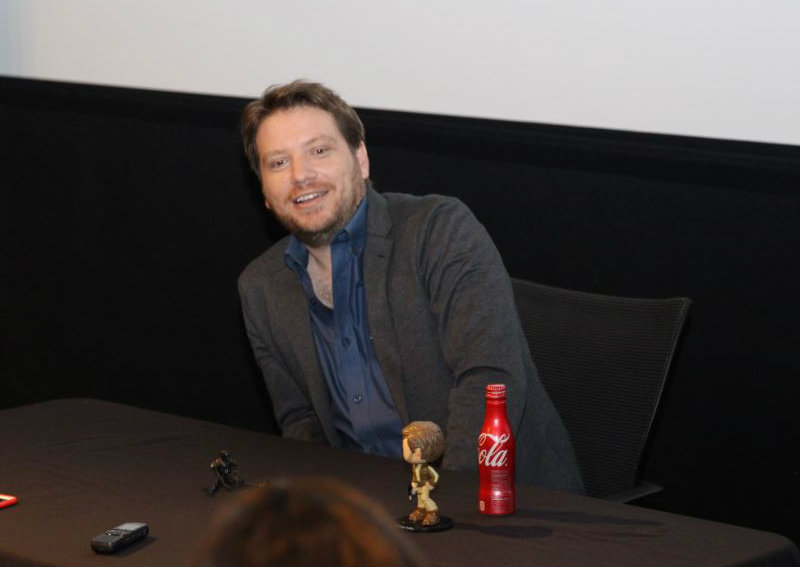
Photo Credit: Louise Bishop/momstart.com
How does it feel to be telling a part of the story that’s arguably one of the most, if not the most, important events in the Star Wars canon?
It feels like probably what the characters feel like in that we know. It was an impossible mission really. It was like something you’re not supposed to succeed at, or survive. Try and make a good, or great Star Wars film is like… Or something that lives up to those masterpieces I grew up with is nearly impossible. We became a band of rebels making the film, and we were rebellious!
We did things we weren’t supposed to do. You know, there’s a set way of making these big movies and we tried to do things, like… We had little sections where we would play. Say the shoot was 10 hours long, or something, one day. The last hour was like a playground. We’d get what we needed for the scene. The last hour it’s like okay, do whatever you want. So we would just play around with the set.
A lot of the stuff that was in the trailer came from things like that. There’s s picture of Krennic in the white cape, and he stood looking with the big, blue sphere behind him. The planet and the Death Star, and that was just messing around. We did this scene, but we never said cut. And we went on for another 40 minutes. And we would just whisper things to Ben and to the actors and move the camera around. Felicity going in as that thing the tunnel lights up around her, as she turns around.
That was the same sort of thing. She walked in, we go okay, okay, and cut. We’re getting her to do the next scene, and she walks into the tunnel, and as she walks into the tunnel, someone just turned the lights on. As she was walk in, I saw the lights are gone around her, and I was, like, oh my God! That looks really good! And it was, like, stop, stop, stop! And it was, like… And everyone goes, what? Hang on, we have to film this. And it was like, no! We’ve got to move on. It’s like, no, no! We have to film this. Okay, Felicity, do that again, but just look around as you do it. And I promised everyone it would take, like, a minute. And so we start rolling. And obviously, you’re like one more take. Okay, one more take.
And, like, an hour later, it’s like, okay.
I think we got it. And everyone’s like, well, where’s it gonna be in the film? And you think, oh, I don’t know! It just looked good. Then, the trailers come in, and Disney shows you, this is what we’re thinking for the trailer. And these shots start turning up. You go, oh, cool! See? I did that.
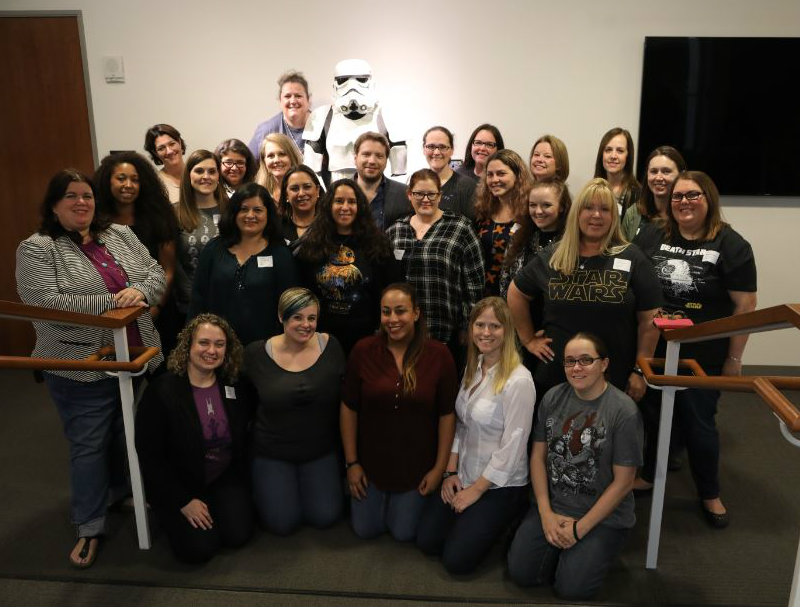
Photo Credit: Louise Bishop/momstart.com
Such a great chat! We could have sat with Gareth and talked a lot longer. He’s so great and is so excited about Rogue One. That definitely shows when you talk to him.
I hope you enjoyed the coverage from our Rogue One interviews. Now, go out and see the movie! Let me know your thoughts!
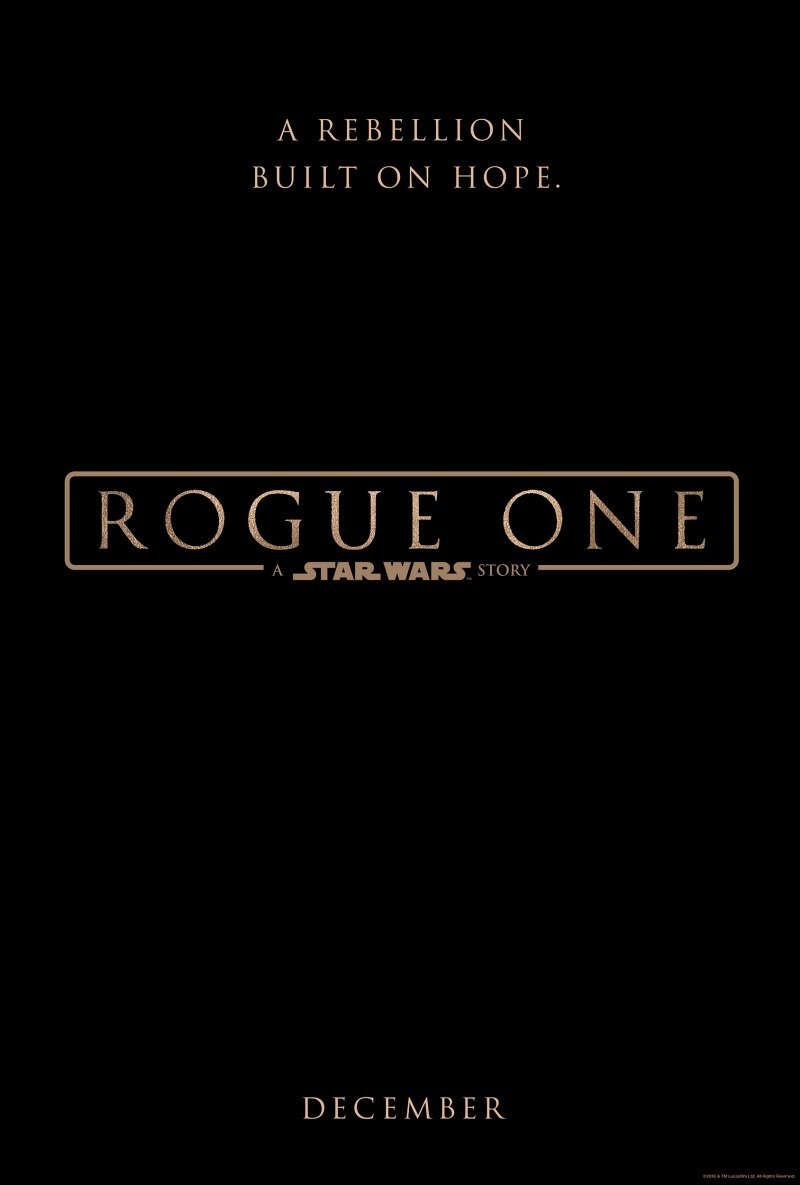
ROGUE ONE: A STAR WARS STORY follows a group of unlikely heroes in a time of conflict who band together on a mission to steal the plans to the Death Star, the Empire’s ultimate weapon of destruction. This key event in the Star Wars timeline brings together ordinary people who choose to do extraordinary things, and in doing so, become part of something greater than themselves.
ROGUE ONE: A STAR WARS STORY is directed by Gareth Edwards and stars Felicity Jones, Diego Luna, Ben Mendelsohn, Donnie Yen, Mads Mikkelsen, Alan Tudyk, Riz Ahmed, with Jiang Wen and Forest Whitaker. Kathleen Kennedy, Allison Shearmur and Simon Emanuel are producing, with John Knoll and Jason McGatlin serving as executive producers. The story is by John Knoll and Gary Whitta, and the screenplay is by Chris Weitz and Tony Gilroy.
Facebook | Twitter | Instagram | YouTube | Official Website
ROGUE ONE: A STAR WARS STORY arrives in theaters everywhere today In RealD 3D and IMAX 3D!